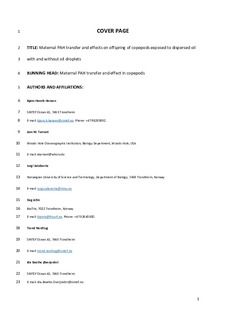| dc.contributor.author | Hansen, Bjørn Henrik | |
| dc.contributor.author | Tarrant, Ann | |
| dc.contributor.author | Salaberria, Iurgi | |
| dc.contributor.author | Altin, Dag | |
| dc.contributor.author | Nordtug, Trond | |
| dc.contributor.author | Øverjordet, Ida Beathe | |
| dc.date.accessioned | 2018-03-06T15:11:50Z | |
| dc.date.available | 2018-03-06T15:11:50Z | |
| dc.date.created | 2017-11-30T13:56:22Z | |
| dc.date.issued | 2017-08-25 | |
| dc.identifier.citation | Journal of Toxicology and Environmental Health, Part A. 2017, 80 (16-18), 881-894. | nb_NO |
| dc.identifier.issn | 1528-7394 | |
| dc.identifier.uri | http://hdl.handle.net/11250/2488984 | |
| dc.description.abstract | Copepods of the genus Calanus have the potential for accumulating lipophilic oil components due to their high lipid content and found to filter and ingest oil droplets during exposure. As female copepods produce eggs at the expense of lipid storage, there is a concern for transfer of lipophilic contaminants to offspring. To assess the potential for maternal transfer of oil components, ovigerous female copepods (Calanus finmarchicus) were exposed to filtered and unfiltered oil dispersions for 4 days, collected and eggs maintained in clean seawater and hatching and gene expression examined in hatched nauplii. Oil droplet exposure contributed to polycyclic aromatic hydrocarbon (PAH) uptake in dispersion-treated adult copepods, as displayed through PAH body residue analyses and fluorescence microscopy. Applying the latter methodology, transfer of heavy PAH from copepod mothers to offspring were detected Subtle effects were observed in offspring as evidenced by a temporal reduction in hatching success appear to be occurring only when mothers were exposed to the unfiltered oil dispersions. Offspring reared in clean water through to late naupliar stages were collected for RNA extraction and preparation of libraries for high-throughput transcriptome sequencing. Differentially expressed genes were identified through pairwise comparisons between treatments. Among these, several expressed genes have known roles in responses to chemical stress including xenobiotic metabolism enzymes, antioxidants, chaperones, and components of the inflammatory response. While gene expression results suggest a transgenerational activation of stress responses, the increase in relatively small number of differentially expressed genes suggests a minor long-term effect on offspring following maternal exposure. | nb_NO |
| dc.language.iso | eng | nb_NO |
| dc.rights | Attribution-NonCommercial-NoDerivatives 4.0 Internasjonal | * |
| dc.rights.uri | http://creativecommons.org/licenses/by-nc-nd/4.0/deed.no | * |
| dc.subject | Copepod | nb_NO |
| dc.subject | dispersion | nb_NO |
| dc.subject | micro-droplets | nb_NO |
| dc.subject | maternal transfer | nb_NO |
| dc.subject | ecotoxicity | nb_NO |
| dc.subject | oil | nb_NO |
| dc.subject | petroleum | nb_NO |
| dc.subject | Arctic | nb_NO |
| dc.title | Maternal polycyclic aromatic hydrocarbon (PAH) transfer and effects on offspring of copepods exposed to dispersed oil with and without oil droplets | nb_NO |
| dc.type | Journal article | nb_NO |
| dc.type | Peer reviewed | nb_NO |
| dc.description.version | acceptedVersion | nb_NO |
| dc.rights.holder | Accepted manuscript © The Author(s) 2017 | nb_NO |
| dc.source.pagenumber | 881-894 | nb_NO |
| dc.source.volume | 80 | nb_NO |
| dc.source.journal | Journal of Toxicology and Environmental Health, Part A | nb_NO |
| dc.source.issue | 16-18 | nb_NO |
| dc.identifier.doi | 10.1080/15287394.2017.1352190 | |
| dc.identifier.cristin | 1520959 | |
| dc.relation.project | Norges forskningsråd: 225314 | nb_NO |
| cristin.unitcode | 7566,6,0,0 | |
| cristin.unitname | Miljøteknologi | |
| cristin.ispublished | true | |
| cristin.fulltext | postprint | |
| cristin.qualitycode | 1 | |

